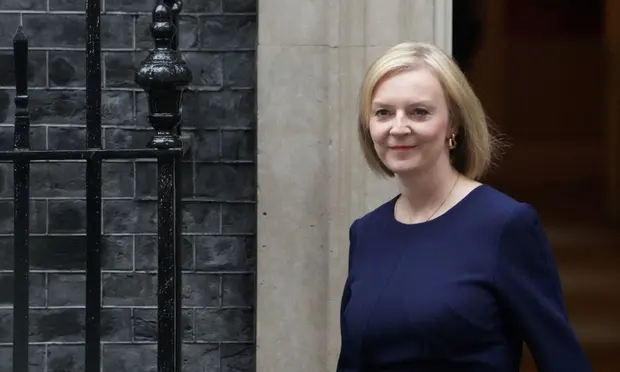Liz Truss announced on Thursday she was quitting No 10 after a calamitous 45 days in office, triggering a Tory leadership contest, with Rishi Sunak, Penny Mordaunt and Boris Johnson battling it out to become Britain’s next prime minister.
At a lectern outside Downing Street during another tumultuous day, Truss admitted that she could not deliver the radical economic mandate on which she was elected by Conservative members.
She will be the shortest-serving UK prime minister ever, having presided over what has been one of the most politically turbulent and economically damaging periods in modern history.
Keir Starmer, the Labour leader, led calls for an immediate general election, arguing it was untenable for the Conservatives to appoint yet another premier without a fresh mandate. Instead, Tory grandees set a deadline of Friday 28 October for the new contest to be completed.
The rivals to succeed Truss immediately embarked on urgent campaigns to sign up at least 100 Tory MPs by Monday afternoon to get on the ballot paper, with Sunak quickly gathering momentum to become the early frontrunner.
Johnson was said by MPs to be considering another tilt at the job, despite quitting in disgrace in July following a series of scandals that left his personal integrity in tatters. Friends said he was planning to return early from a Caribbean holiday to gather support.
Tory insiders claimed that, although popular with party members, Johnson was a deeply divisive figure among MPs and would struggle to reach the required threshold for nominations.
“The brutal truth for Boris is that his support has not shifted at all since he was ousted. I can’t see him getting more than 60 votes. He’s done,” said one. However, his closest allies were already canvassing Tory MPs, telling them he was responsible for their 80-seat majority at the last general election. Were Johnson to make into the final run-off, he is likely to be the favourite among party members.
It was reported on Thursday night that the former prime minster was planning on reaching out to Sunak, his former chancellor, in a bid to secure enough nominations to make the final ballot.
Penny Mordaunt, the leader of the Commons who came third last time round, could also make the first cut unless the right of the party backs one of their own instead. If only one candidate reaches the 100-MP threshold on Monday, then they will automatically take over.
Jeremy Hunt, the new chancellor who buried Truss’s economic strategy with a series of humiliating U-turns after he took over from the sacked Kwasi Kwarteng, ruled himself out of standing, although is expected to stay in post if Sunak or Mordaunt win, in an attempt to steady the markets.
Foreign secretary James Cleverly, Tory heavyweight Michael Gove and centrist Tom Tugendhat have all said they will not stand.
Truss’s downfall was accelerated by the chaotic scenes of Wednesday, in which Suella Braverman resigned as home secretary over a breach of security protocol, before dozens of Tory MPs were left confused and furious by a slapdash and brutal whipping operation over a vote on fracking, which the government ended up winning easily.
Shortly after 1.30pm Truss stood before a lectern placed outside the No 10 door to give a statement that lasted just 90 seconds.
Truss said she had entered office with “a vision for a low-tax, high-growth economy that would take advantage of the freedoms of Brexit”.
She went on: “I recognise that, given the situation, I cannot deliver the mandate on which I was elected by the Conservative party. I have therefore spoken to His Majesty the King to notify him that I am resigning as leader of the Conservative party.”
She and Brady, who chairs the 1922 Committee of Tory MPs, had agreed a timetable under which a successor would be chosen in just a week, Truss said, as opposed to the near-two months contest over the summer which saw her succeed Boris Johnson.


